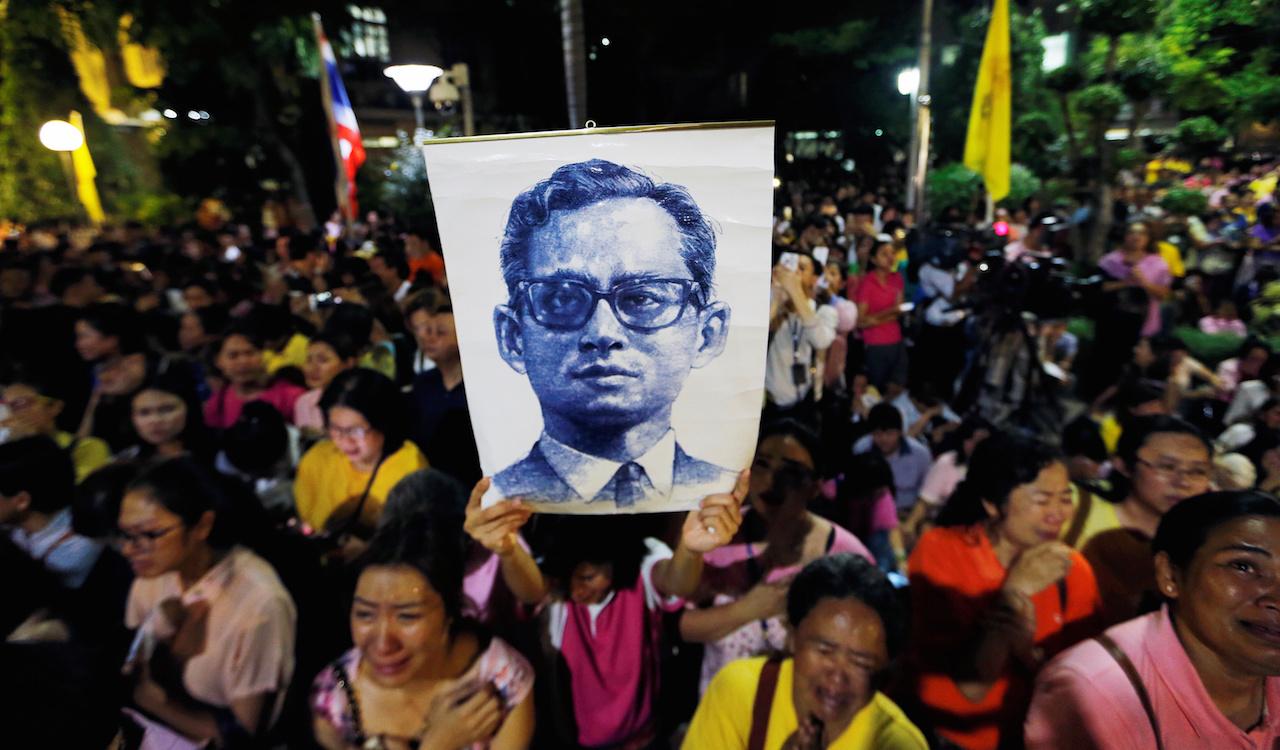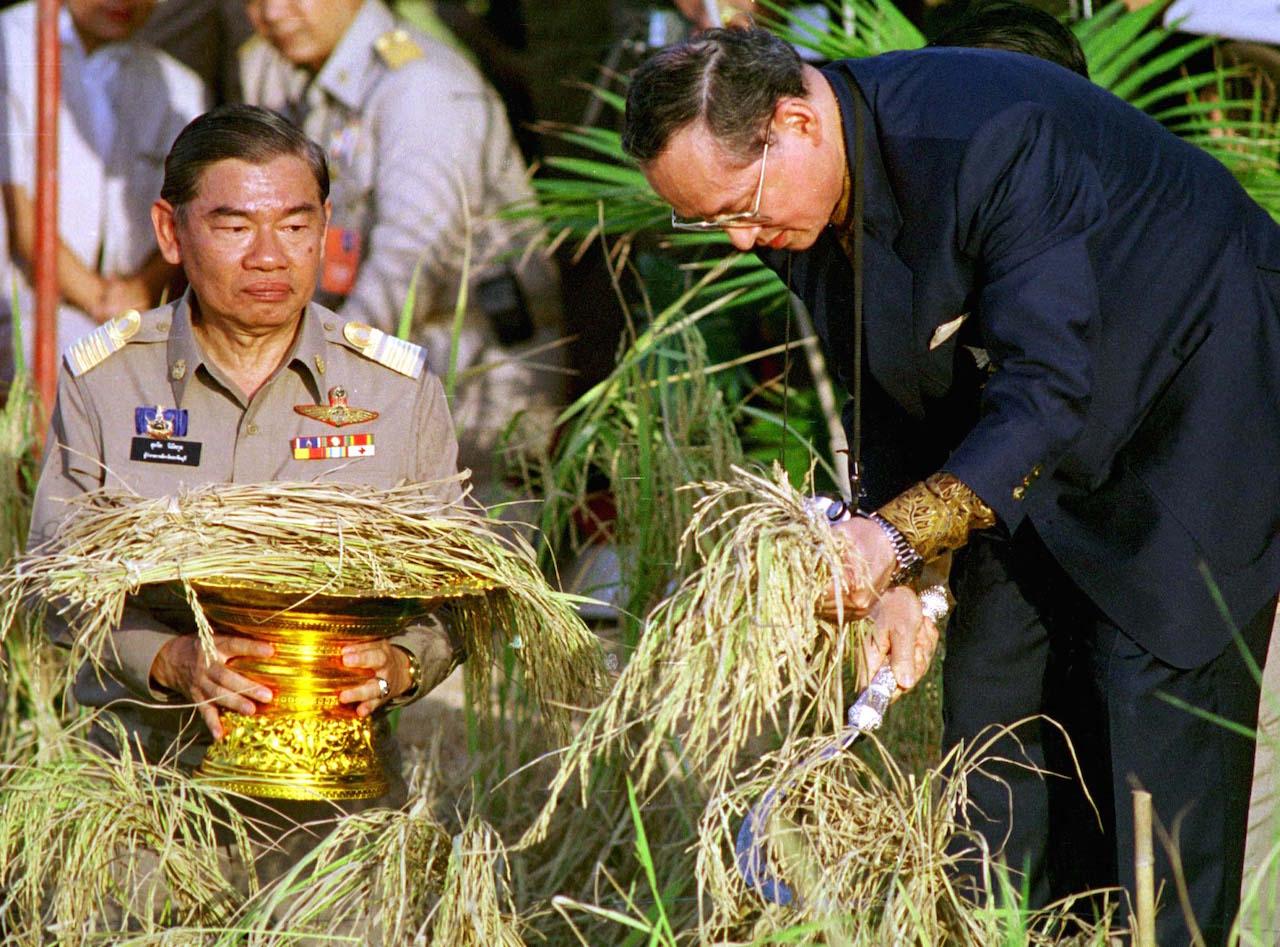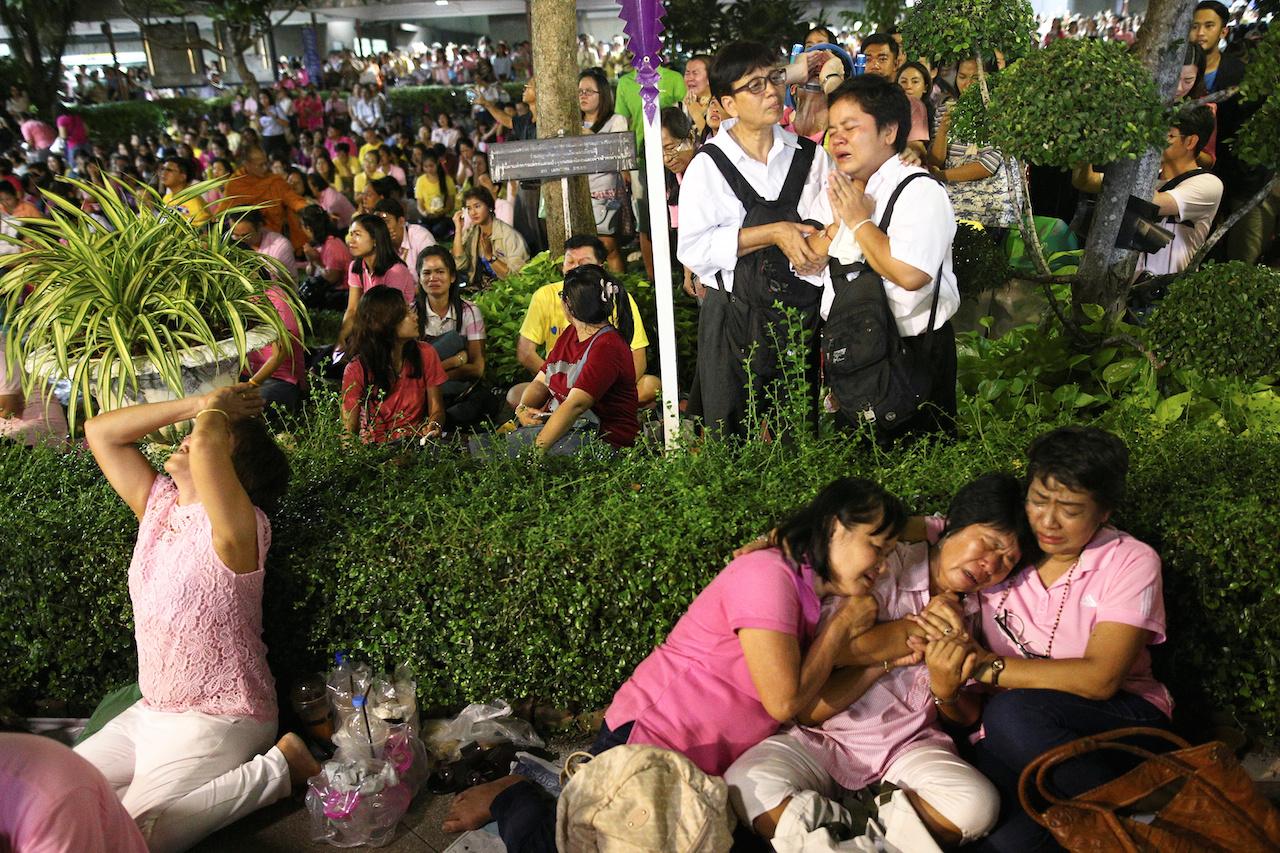People react shortly after it was announced that Thailand's King Bhumibol Adulyadej died at the Siriraj hospital in Bangkok, Thailand, Oct. 13, 2016.
The death of the world’s longest-reigning monarch should come as no surprise.
After all, at 88, King Bhumibol Adulyadej of Thailand was clinging to life. His public appearances had grown extremely rare and, when he did speak, his voice was woefully faint. His death, apparently from organ failure, was hardly unexpected.
Yet Thais are nevertheless reeling, not only with grief but with angst.
Though this event has been discussed in whispers for years, open talk of the king’s passing has been effectively criminalized — thus stifling any real public reckoning in advance of this long-dreaded day.
Thailand’s king is exalted in a way that is highly unusual for a 21st-century monarch. His eminence derives from genuine public love. But it’s also enforced by draconian laws. To criticize the monarchy in public — or even to offer remarks short of high praise — can bring on public shaming or, worse yet, prison time. That’s the way many royalists like it.
Thai royalists will sometimes remark that foreigners can never truly fathom their love for the king. They have a point. Many Thais, from noodle vendors to millionaires, regard the king with a near-religious devotion. They tend to see even mild criticism as heresy.
In their eyes, Bhumibol is intertwined with the Thai identity and to lose him is to feel its essence dim. Teary-eyed crowds have swelled outside the riverside hospital where he died.

Bhumibol, born in Massachusetts while his father attended Harvard University, was the only king ever born on American soil. He ruled for 70 years. For decades, Thai children have been taught that their king is a paragon of virtue — an ideal father figure, draped in golden finery, that sits atop the pinnacle of Thai society.
Historically, Thai monarchs were treated as near-celestial beings. The current royal family is still honored by archaic traditions. For Thais, kneeling in the presence of royalty is mandatory. Royals must also be addressed in a grandiose dialect called “ratchasap,” a special form of the Thai language. Many children learn it on the remote chance that they will someday speak with royalty — or just to comprehend televised news updates on the royal family.
Palace accounts of Bhumibol’s abilities have also suggested near-supernatural talents in engineering, jazz and sailing. He is known as “the Lord upon our heads” and his subjects are said to be “beneath the dust on the sole of the royal foot.” Campaigns promoting his grandeur are extremely well funded. In 2015, Thailand spent a whopping $485 million to “uphold, protect and preserve the monarchy from any offenses.”
This budget ensures that the king’s image is omnipresent in Thailand. His face appears on gold-framed portraits hung over streets and inside every government office. His visage also beams down from photos tacked up in shophouses and bedrooms across the country of 67 million.
When Bhumibol was born, in 1927, his nation was called Siam — a kingdom ruled from a royal palace. That ended in 1932 when a coup, plotted in part by military officers, ended the direct rule of kings.
Since then, Thailand has been largely controlled by the army, political parties betrothed to the army, or occasionally parties allowed to rule after winning elections. All the while, the king has served as head of state — a position that endures even as lesser political players rise and fall.
Thailand’s current government is a military junta. Its generals, who seized power in 2014, extol the monarchy’s greatness at every turn. Because the palace is so highly revered, those close to its orbit wield great social status thanks to their proximity. These elites, many of them military officers, hold tremendous sway over politics and business.
Despite the extravagant pomp that surrounds the palace, Bhumibol has also been depicted as a friend to commoners in the rice fields.
In fitter days, back in the 1960s, he was presented as the people’s great problem solver. Clad in everyday clothing, he traveled from village to village, ordering the creation of wells, roads and clinics. Photos circulated by the palace depict grateful villagers kneeling at his feet. The US government, fearful of communists in neighboring states, egged on the king’s charity work in hopes it would quell Marxist revolution.

Thanks to well-funded promotional campaigns, many Thais can imagine him either on a golden throne or with the poorest of the poor in a remote jungle clearing. Even today, the king’s name graces thousands of royal development projects — from dams to cloud-seeding planes — aimed at the rural poor.
Scientifically measuring the Thai population’s feelings on the monarchy is effectively impossible. Registering a sentiment other than reverence is dangerous, though it’s clear that the majority of Thais genuinely adore the king. But even military generals admit that a minority of Thais have ill feelings toward the monarchy.
Most criticism dwells on palace connections to the army, which has repeatedly overthrown political parties elected by the masses. The internet has been a boon to these clandestine critics. They have been pursued by state-backed “cyber scouts” scouring the web for critical remarks.
In recent years, as the king’s health worsened, enforcement of royalist anti-defamation laws has been set on a hair trigger. Thais have been locked up over mere innuendo or private Facebook chats deemed insufficiently reverent. The palace’s magical aura has been increasingly challenged by the digital age.
But it will be even more difficult to sustain that aura once the king’s heir apparent, Thailand’s crown price, takes the throne.
The prince, named Vajiralongkorn, is 64. His formal title includes the honorific “Jao Fa,” which means “lord of the skies.” He’s an avid pilot who spends much of his time abroad. He has been married multiple times: once to his first cousin, once to an actress and most recently to a third woman whom he divorced in 2014. He has children by all of his former wives.
How Vajiralongkorn will rule is uncertain. Like his father, he is protected by laws forbidding even meek criticism. But Vajiralongkorn will take the throne in an era marked by frenzied online chatter and digital forces that delight in goading entrenched institutions. Even if he chooses to imitate his father’s style, there will be no way to replace the grandeur that surrounded Bhumibol, a king whose eminence was nurtured by the state for more than seven decades.
The World is an independent newsroom. We’re not funded by billionaires; instead, we rely on readers and listeners like you. As a listener, you’re a crucial part of our team and our global community. Your support is vital to running our nonprofit newsroom, and we can’t do this work without you. Will you support The World with a gift today? Donations made between now and Dec. 31 will be matched 1:1. Thanks for investing in our work!
